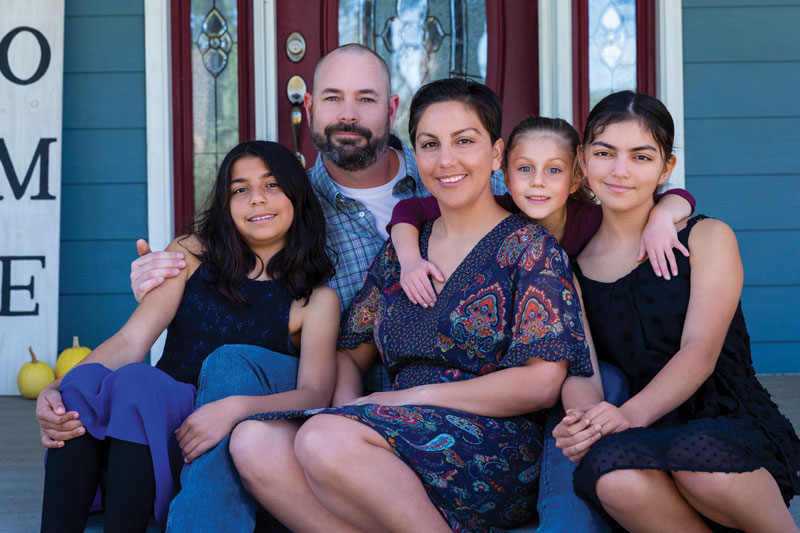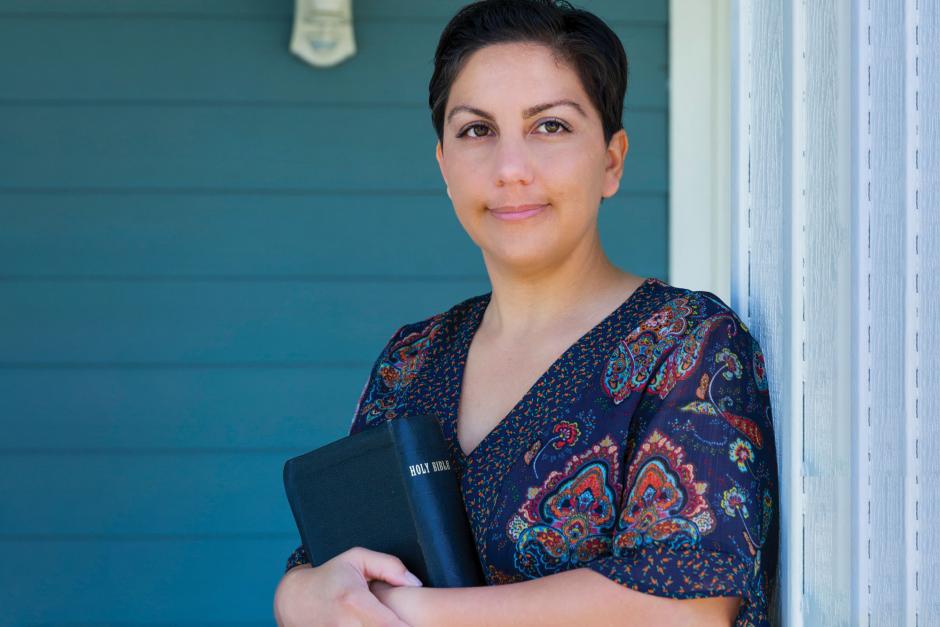Righting a Wrong
Andrew McChesney May/June 2022Teresa Brown, raised by hardworking Seventh-day Adventist parents in California, was used to jumping through hoops to avoid working on Saturdays, her day of worship.
At one of her first jobs, scooping ice cream at a Baskin-Robbins store, the manager kept scheduling her to work on Saturdays, and she repeatedly had to ask the owner for help.
On her first day of work as a certified nursing assistant at a state prison, she barely got out of the Saturday shift by pleading with her supervisor.
But Teresa wasn’t sure where to turn when the issue surfaced again and the California Department of Corrections and Rehabilitation (CDCR), one of the state’s biggest employers with 68,000 workers, rejected her application to become a prison guard. The rejection letter arrived without warning.

“I never, ever expected a letter of denial. That was not something I saw coming at all,” Teresa, 37, said in a Zoom interview from her home in Pine Grove, California. “Normally I end up talking with someone. People have more questions. So that was a big shock for me.”
Distraught, Teresa wept over the seeming unfairness of losing a job because of her observance of the Sabbath, which for Adventists lasts from sundown Friday to sundown Saturday. Then her thoughts turned to others whose dreams also might have been dashed because of their faith.
“I wondered how many people were not able to go through with jobs for their faith,” she said.
She decided to go to court.
Number-one Religious Freedom Problem
Although the United States Constitution enshrines religious liberty as a fundamental right, religious liberty advocates say that the case of Teresa Brown v. California Department of Corrections and Rehabilitation is far from unique. Just as Teresa faced Sabbath work conflicts for years before her lawsuit, other employees also encounter regular challenges to their faith.
“Every day there are several Americans who are fired for no other reason than their faith commitment,” said Alan J. Reinach, who oversaw the legal team on Teresa’s case and has three decades of experience with First Amendment and religious discrimination cases. “This is the number-one religious freedom problem in America today.”
Richard T. Foltin, a veteran religious liberty lawyer not involved with Teresa’s case, echoed those concerns.
“The biggest issue is people who need time off—not working on the Sabbath or other religious holidays,” said Foltin, who has testified at U.S. congressional hearings on religious discrimination in the workplace. “While the law provides some protections, it is not as much as we want.”
No one knows precisely how many such cases occur each year. The U.S. Equal Employment Opportunity Commission (EEOC), a federal agency established through the Civil Rights Act of 1964 to administer and enforce civil rights laws against workplace discrimination, reported settling at least five cases of religious discrimination in 2021, including two involving Adventists. In one of those cases, snack-food giant Frito-Lay agreed to pay $50,000 for firing a newly promoted Adventist employee who had declined to attend Saturday sessions to train for his new job. In the other case, a Florida hotel agreed to pay $99,000 for firing an Adventist room attendant who would not work on Saturdays. The hotel had accommodated the employee’s faith for 10 months but changed its policy after hiring a new manager.
In settling the hotel case, the EEOC indicated that it receives many complaints about employers who refuse to grant religious accommodation.
“Florida is a religiously diverse state, and EEOC receives many charges alleging religious discrimination where an employer refuses to modify a work schedule,” Paul Valenti, director for the EEOC’s Miami District Office, said in a statement on December 7, 2021. “We hope this case educates employers of their legal obligation to grant requests for religious accommodations where it would not impose an undue hardship.”
The EEOC cases represent the tip of the iceberg, lawyers said. Not everyone has resources to file a complaint or to bring a lawsuit. Many others simply prefer to look for another job.
At stake is the U.S. commitment to religious freedom and equal employment opportunity, said Reinach, who serves as executive director of the Church State Council, the religious liberty arm of the Pacific Union Conference of Seventh-day Adventists. If the CDCR ultimately prevails in his client’s case, he said, it could be emboldened to exclude from hiring anyone with a regular weekly religious commitment. Potentially any person of faith would be affected: a member of a church choir, a weekly Bible study, or a weekly prayer service—anyone with a regular commitment to a faith community.
“It’s wrong for the state to tell you that as a condition of employment you have to forgo your right to worship regularly with your community,” Reinach said. “It violates our fundamental commitment to equality.”
Special Time With God
Sabbath worship played an important role in Teresa Brown’s identity as a child. She looked forward to gathering at the Spanish Seventh-day Adventist church in Stockton, located about 50 miles south of California’s capital, Sacramento. Born in the city to Mexican immigrant parents, she especially loved singing songs about Jesus in the children’s Sabbath School class. All the songs that she learned were in Spanish.
Church outings also left a big impression. Teresa and her three brothers didn’t get out often because their family, like many in Stockton, did not have much money. Their parents sold leather belts, wallets, and jackets at local flea markets. So being part of the Adventist Church was an opportunity to go places: campouts, outdoor worships, and a trip to Lake Tahoe, where Teresa saw snow for the first time.
“I was 14 years old when I first saw snow,” Teresa recalled. “I was not wearing the proper clothes. We couldn’t afford snow pants. I was soaking wet, but it was fun.”
Sabbath was more than singing and outings for Teresa while growing up. It was a time to step back from the whirlwind of the week’s activities to spend time with God. “I felt that having this one day to be able to connect with our Father was really important,” she said.
Court papers testified to Teresa’s strong commitment to her faith. “At all relevant times, Plaintiff Teresa Brown … is and was a devout Seventh-Day [sic] Adventist,” Sacramento Superior Court judge Kevin R. Culhane wrote in his decision awarding her damages on December 22, 2021.
When she was 18, Teresa was open about her faith when she met for a job interview with the owner of a Baskin-Robbins ice cream store in Stockton. She remembered seeing the owner beam with joy when she explained that she was an Adventist.
“I had an Adventist once!” he told her. “Best worker I ever had!”
However, the store manager quickly made it clear that she found it bothersome to create a special work schedule for Teresa. After a while she began to schedule Teresa on Saturdays. When Teresa told her that she could not work, she made Teresa feel as though it was her fault that the schedule had to be redone. Sometimes the manager refused to take Teresa off the Saturday shift, and Teresa had to turn to the owner for help. He always resolved the issue, but the manager’s wrath only seemed to grow. She cut Teresa’s work hours and refused to speak to her. Teresa remained at the job for nine years, mostly because of the owner’s support.
Teresa also was open about her faith when she applied to the CDCR to work as a certified nursing assistant. She had dreamed about going into the medical field since she was 14, when she watched her 17-year-old brother die. Her brother and his best friend had been playing with guns in their home, and a gun had tragically gone off.
“I know I was only 14 years old, but in my mind I felt that if I had had medical training, I could have somehow saved my brother,” Teresa said. “He died in my arms, and there was nothing I could do about it. I felt helpless.”
Teresa was excited to start work as a CNA at the Stockton-based state prison known as the California Health Care Facility, which houses inmates with long-term medical needs or acute mental health challenges. On her first day, however, she saw that she had been scheduled to work on the Sabbath. Teresa went to her supervisor to explain that the 2:00 p.m.–10:00 p.m. shift on Friday overlapped with her Sabbath.
“I’m sorry, but I can’t just work with everybody,” the supervisor replied. “If I sat with every person and tried to fulfill everybody’s needs, I’d be in big trouble. I can’t help you.”
Teresa asked if she could take a vacation day or a sick day on the Fridays when she was scheduled.
“You can’t do that,” the supervisor said. “That would be too many times.”
Teresa kept persisting. “How can you help me?” she said. “I am willing to work any other shift.”
The supervisor looked unhappily at Teresa.
“You know what?” she said finally. “I have a shift for you.”
She offered the shift from 10:00 p.m. to 6:00 a.m., Saturday to Thursday. Few employees wanted the late-night shift. For Teresa, it posed an additional burden because she would have to rush home to take her daughters to school.
“There,” the supervisor said. “Does this solve your problems?”
Teresa gratefully accepted the arrangement.
Taking on the CDCR
In September 2013 Teresa decided to apply to work as a prison guard. The timing seemed perfect. Around the same time, the CDCR had decided to hire 7,000 new guards.
Teresa was open about her faith when she filled out the online application form, which asked about her “willingness to work day, evening, or night shifts, weekends, and holidays, and to report for duty at any time emergencies arise,” according to court papers. She made a note that she could not work from sunset Friday to sunset Saturday.
Several months passed, and she took and passed a written exam in Sacramento. Shortly afterward she received a phone call inviting her to take a physical fitness test with dozens of other job applicants on a Saturday.
“I can’t do it that day,” Teresa said, and she explained why.
“But we never do the test any other day,” the caller said.
“Can you go to someone higher up and find out?” Teresa asked.
The CDCR rescheduled her physical fitness test for a weekday. Teresa was the only job applicant who showed up for the test, and she passed it.
At a subsequent oral interview, Teresa was asked about a note that she had made in her application papers about not working on Sabbath. “What does that mean?” the interviewer said. “Why can’t you work these hours?” Teresa explained her religious convictions and the interview ended. In the following weeks, requests came for more documents.
The next thing that Teresa heard from the CDCR was the rejection letter in the mail.
Teresa searched online for a lawyer willing to take her case, but everyone turned her down, saying they did not take religious cases. Then someone told her about Alan Reinach and the Church State Council.
Reinach filed suit against the CDCR on March 11, 2015, for religious discrimination and failure to accommodate Sabbath observance. He assembled and worked together with a legal team comprised of Wendy Musell, a respected trial lawyer who specializes in employment cases; and law students and professors from Stanford Law School’s Religious Liberty Clinic, a program that gives law students an opportunity to fine-tune their analytical and litigation skills on religious liberty cases.
In early 2019, after a yearlong legal proceeding, the trial court sided with the CDCR, holding that the prison system is entitled to require all employees to be available 24 hours a day, seven days a week. The Religious Liberty Clinic at Stanford Law School took the lead on the appeal, arguing that the court had applied the wrong legal standard—that the CDCR had to prove it would be an undue hardship to hire someone who needed a Sabbath scheduling accommodation.
The appellate court agreed, reversing the trial court and remanding the case for the court to determine whether the CDCR had met its burden to prove that any accommodation would have caused an undue hardship.
Because CDCR did not introduce any such evidence, the trial court issued a new decision in Teresa’s favor on December 22, 2021, awarding her $301,277 in damages and directing the CDCR to restore her to the hiring process. The court ruled that the CDCR, in rejecting Teresa’s job application out of hand, had failed to uphold its legal obligation to first explore “any available reasonable alternative means of accommodating the religious belief or observance” and to ascertain whether such accommodation would amount to “undue hardship.”
For Teresa, the first victory came several years before the 2021 ruling. About a year after she went to court, the CDCR adopted a policy to ensure that its officers followed the law in exploring whether they could provide religious accommodation to job applicants of faith.
“Seemingly out of the blue, but in an obvious response to Teresa’s case, the CDCR adopted a religious accommodation policy that fixed the problem, at least on paper, as far as giving formal guidance on what you do if somebody requests a religious accommodation,” Reinach said.
The policy change encouraged Teresa. “It was never for the money. I never did it for the money,” she said. “I felt that you could make a change for the next person. Even if I don’t get the job, other Adventists will have the opportunity to become correction officers. I don’t feel that because you are an Adventist you should be excluded.”
Teresa’s legal fight, though, is not yet over. In February this year the CDCR gave notice that it will appeal the court’s decision. Teresa and her legal team will continue their efforts to ensure that no one—whether Christian, Muslim, Jewish, or otherwise—can be barred from seeking employment in California simply because of their day of worship.
Speaking several weeks after the court ruling, Teresa said the legal ups and downs of the past few years have only strengthened her faith.
“I feel that every time I have been faithful, He opens more doors and rewards me for what I have done,” she said. “I pray that His will be done.”
A Personal Choice

Teresa is naturally reserved, and her court battle is not known by many, even among her acquaintances. But those who know have sharply divided opinions. Some have applauded her as a defender of religious freedom. Her mother, who raised her to observe the Sabbath, is happy about her faithfulness. But her father, who is not an Adventist, has asked many questions. Others have wondered if it is a violation of the Sabbath to work as a CNA or a prison guard, telling her that “a nurse has to work” or “you could have worked because you are in law enforcement.”
“I feel it is a personal choice,” Teresa said in the interview. “I know everybody has a personal perspective on the Sabbath. In law enforcement and nursing, if someone works on the Sabbath, that’s between them and God.”
Teresa’s eldest daughter, Lyani, 15, also has asked questions about the court case.
“Once she asked me, ‘What made you start this?’” Teresa said. “I told her, ‘Sometimes, if you feel that you are wronged, you can reach out and hopefully make it right.’”
Teresa’s actions seem to have spoken louder than words. Lyani loves cross-country running, and many of her big races are scheduled on Saturdays. Teresa left it up to her daughter to decide whether to run on Sabbath. To the dismay of the coach, Lyani chose to compete only on weekdays.
“She told me that the coach asked her, ‘Are you an Adventist or something? Because you have not been coming to the competitions on Saturday,’” Teresa said.
Lyani confirmed that she was an Adventist. To the girl’s surprise, the coach expressed respect.
“I read an article about a guy who would not compete in the Olympics on Saturdays,” she said.
Amid the eight-year legal struggle, it was one of those bright moments that made Teresa happy.
“I feel that this has been an example for my kids, watching me all these years,” she said. “I feel it has impacted them.”
Article Author: Andrew McChesney
Andrew McChesney is editor for Adventist Mission at the General Conference of Seventh-day Adventists. For eight years he was editor in chief of the Russian English-language newspaper the Moscow Times and was later news editor of the Adventist Review. He’s on Twitter, @ARMcChesney.
